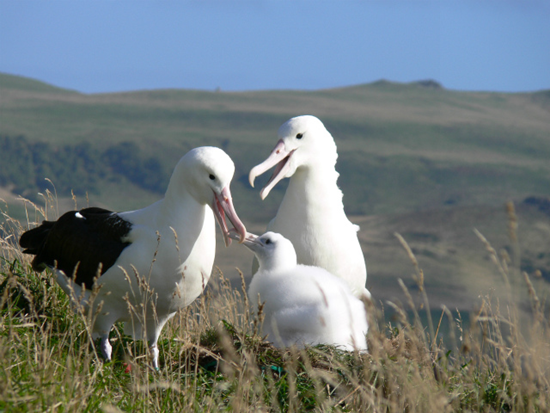
A Northern Royal Albatross family at Pukekura/Taiaroa Head, photograph by Junichi Sugushita
The last Endangered Northern Royal Albatross Diomedea sanfordi chick of the 2024/25 breeding season has fledged from Pukekura/Taiaroa Head. A total of 38 chicks fledged from the colony, making it the most successful season on record. The previous record of 33 was from each of the last two seasons. The colony has grown from one breeding pair in 1937 to more than 80 pairs in [2024/]2025. Eighteen fledglings were fitted with GPS trackers, showing that some are already most of the way across the Pacific heading towards South America.
Department of Conservation (DOC) Coastal Otago Albatross Ranger Sharyn Broni writes:
“It’s been a fantastic season at Pukekura. The weather has been great with slightly cooler temperatures over summer, so there haven’t been overheating or flystrike issues, which is better for both the birds and rangers.
“The chicks have also needed less supplementary feeding than in past years, which suggests there was plenty of food available for the parents. We even found a 2-kg eel next to one nest, which a parent had brought back! There were several chicks, however, which lost one or both parents and required a lot of support from the rangers to ensure they were a healthy weight prior to fledging.
“Unfortunately, one chick took off successfully but was found dead at a local beach several days later. We don’t know what the cause was. It’s sad, but it’s natural that not all the chicks will be successful once they leave the colony.”
DOC co-manages the albatross colony as part of Te Poari a Pukekura (the Pukekura Co-management Trust) alongside Te Rūnanga o Ōtākou, Korako Kareta i Trust and Dunedin City Council, with the support of the Otago Peninsula Trust.
Information from the Department of Conservation.
Read about the 2024/25 Royal Cam chick fledging here.
John Cooper, Emeritus Information Officer, Agreement on the Conservation of Albatrosses and Petrels, 22 October 2025

 English
English  Français
Français  Español
Español